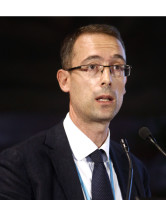Longevity, Ageing and Long-term Care
Healthcare Systems
Public Health & Health Policy
Elderly Care & Geriatrics
Post-Doctoral Fellowships
Belgium
2016.09.30
Investigating public health policies to improve end-of-life care for elderly people
Reviewing EU-level and Belgian health public policies to outline the most efficient ones
To produce this invaluable synthetic study, Dr. Lara Pivodic and her team will move forward in two stages. First, the researchers will conduct an analysis of the quality of end-of-life care in the population aged 85 or over in Belgium. This way, the study aims to accurately describe the main risks associated with poor end-of-life care in the older population. The second step will consist of a more innovative approach. Dr. Lara Pivodic will analyze whether relevant EU-level and Belgian health and social policies are available to address the risks of poor end-of-life care. To carry out this part of the study, the team will conduct a documentary analysis, as well as consult experts and stakeholders.
Dr. Lara Pivodic’s research focuses on a doubly vulnerable population that has not received a lot of attention to date, those over age 85 who are dying from progressive and incurable disease. Her project will lay important foundations for improving quality of life for this age group, now and in the future. “End of life and palliative care need to be improved everywhere in the world. But some countries have better policies than others”, Dr. Pivodic points out. By conducting this study, she intends to shed light on those policies which have the potential to mitigate or even prevent the health, social, and socio-economical risks which result from poor end-of-life care.

Lara
PIVODIC
Institution
Faculty of Medicine and Pharmacy
Country
Belgium
Nationality
Austrian
Related articles
Longevity, Ageing and Long-term Care
Societal Challenges
Demography
Emerging Market
Income & Wealth
Inequality & Poverty
Joint Research Initiative
United States
2018.04.30
Mortality: towards reliable estimates in developing countries
Getting the most out of unreliable data, and actuarial applications Indeed, by attempting to prove that the mortality datasets available... Read more

Magali
BARBIERI
University of California - Berkeley
Women's Health
Healthcare Systems
Pregnancy & Maternal Health
Public Health & Health Policy
Emergency Care & Crisis
Post-Doctoral Fellowship
United Kingdom
2019.08.31
Towards timely and quality access to emergency obstetric care in Sub-Saharan Africa
At least four out of ten women develop unpredictable complications during pregnancy, childbirth and/or after delivery. Globally, over 300,000 women... Read more

Aduragbemi
BANKE-THOMAS
